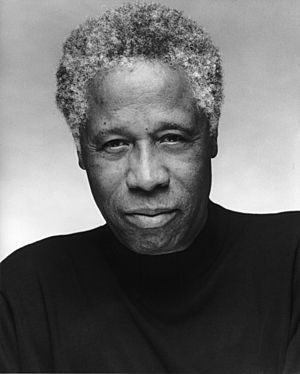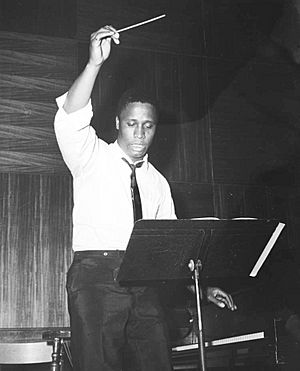William Appling facts for kids
Quick facts for kids
William Appling
|
|
|---|---|

William Appling in 1996
|
|
| Born | November 3, 1932 |
| Died | August 29, 2008 (aged 75) The Bronx, New York City, U.S.
|
| Occupation | Musician, conductor, pianist, educator, arranger |
| Years active | 1950-2008 |
William Thomas Appling (born November 3, 1932 – died August 29, 2008) was a famous American musician. He was a conductor, pianist, teacher, and arranger. For nearly 25 years, he led the William Appling Singers & Orchestra. He also conducted many other choirs and musical groups. As a pianist, he played with famous conductors like Robert Shaw. He was the first African American to record all the piano music by Scott Joplin. William Appling taught at several schools and universities. These included Vassar College and Case Western Reserve University. He also made many recordings and his music arrangements are still performed today.
Contents
William Appling's Life Story
Growing Up and Education
William Appling was born and grew up in Cleveland, Ohio. He was the youngest of seven children. His parents were not musicians, but they supported his musical talent. He went to John Adams High School. He later earned two degrees from Case Western Reserve University. He studied piano with several teachers, including Leonard Shure. He also learned to play the organ.
William Appling's Amazing Career
Leading Choirs: A Conductor's Journey
In Cleveland, William Appling directed the Choral Club of Glenville High School. This was from 1955 to 1965. Under his guidance, the choir became very well known. They sang at the Hollywood Bowl and the 1964 New York World's Fair. In 1965, they performed a sold-out concert at Severance Hall.
Appling also directed other groups. These included the Case Men's Glee Club and the West Shore Chorale. He was a guest conductor for the Cleveland Philharmonic Orchestra. In 1965, he won an award for choral conducting. This allowed him to work with the Cleveland Orchestra.
In 1979, Appling started his own group, the William Appling Singers & Orchestra (WASO). They performed many types of choral music. Their first show was in 1980, featuring music by Mozart. WASO also performed new music by American composers. They were known for their performances of J.S. Bach's Mass in B minor. Their holiday shows of Handel's Messiah became a tradition.
After moving to New York in 1990, Appling restarted WASO there. They performed often in the 1990s and early 2000s. WASO worked with the Bard Music Festival. In 1992, a critic praised their performance of Richard Strauss's Deutsche Motette. In 1996, WASO celebrated the 250th birthday of William Billings. He was America's first great composer.
Playing the Piano: A Soloist's Talent
William Appling was also a busy concert pianist. He gave many recitals in Cleveland in the 1950s and 60s. In 1962, he played George Gershwin's Rhapsody in Blue with the Cleveland Orchestra. He also performed at The Town Hall in New York City.
He played with famous musicians like Darius Milhaud and W. C. Handy. In the 2000s, he focused on the music of Scott Joplin. He performed Joplin's music at various venues.
Arranging Music: A Creative Touch
Appling arranged many Negro spirituals for choirs. Two of his arrangements are published: We Shall Walk Through the Valley in Peace and Yonda' Come Day. His arrangement of We Shall Walk Through the Valley in Peace is very popular. It has been recorded by famous groups like Chanticleer.
Teaching Music: An Educator's Impact
William Appling taught at several schools. He was at Case Western Reserve University and the Cleveland Institute of Music. From 1965 to 1989, he taught at Western Reserve Academy. He became the head of the music department there in 1971.
At Western Reserve Academy, Appling helped build a strong music program. He gave students many chances to perform. In 1972, some students from the WRA Glee Club toured Europe. The school's music department also held annual Music Festivals.
In 1972, Appling started the Summer Music Experience. This was a six-week program for talented high school music students. It offered intense training and performance chances. Famous musicians like Robert Shaw and André Watts taught master classes.
In 1989, Appling left Western Reserve Academy. Many students and parents were upset. He later reached an agreement with the school.
In 1990, Appling became the Director of Choral Activities at Vassar College. He led the Vassar College Choir and Madrigal Singers. They performed at the school and in New York City. In 1996, Appling organized a discussion about the Amistad story. It included famous African American composers.
William Appling's Recordings
As a Conductor
Under Appling's direction, the Glenville High School Choral Club released an album in 1962. It included classical works and spirituals arranged by Appling.
In 1969, the Case Men's Glee Club released Cantate Domino. This album featured various works and Appling's spiritual arrangements.
In 1970, Appling conducted The University Circle Singers. They recorded a modern American music piece.
The William Appling Singers & Orchestra released several CDs. These included Wake Ev'ry Breath (music by William Billings) and Shall We Gather (American hymns and spirituals).
As a Pianist
Appling recorded Spirituals with soprano A. Grace Lee Mims in 1981. Many songs on this album were arranged by Appling.
In 2010, William Appling Plays Scott Joplin & J.S. Bach was released. It featured works by J. S. Bach and Scott Joplin.
From 2006 to 2007, Appling recorded all of Scott Joplin's solo piano music. This was a total of 46 pieces. The 4-CD set, Scott Joplin, The Complete Rags, Waltzes & Marches, came out in 2017. It was the first "complete Joplin" recorded by an African American pianist.
His recording of Joplin's "Solace" was featured by The New York Times. His recording of The Entertainer is at the National Museum of African American Music. His Maple Leaf Rag recording is in a video by the Morgan Library & Museum.
Awards and Special Honors
William Appling received many awards. In 1954, he won First Prize in Piano from the National Association of Negro Musicians. He also won a scholarship for music study in 1947.
In 1965, he received the first Fellowship Award for Choral Conducting. This was with the Cleveland Orchestra.
In 1998, Appling was honored in the Glenville Hall of Fame.
After his death in 2008, two special events were held to honor him. Celebrating William Appling was in New York City in 2009. Another tribute, A Tribute to William Appling: The Celebration Continues!, was held in 2013.
Since 2012, Western Reserve Academy has held an annual William T. Appling Memorial Concert. This honors his big contributions to music and the school.]]
 | William L. Dawson |
 | W. E. B. Du Bois |
 | Harry Belafonte |


